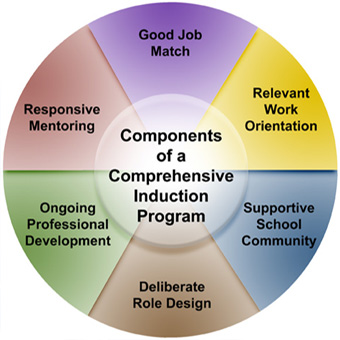What supports can school leaders provide to develop effective and committed special education teachers?
Page 4: Components of a Comprehensive Induction Program

Once school leaders have established goals for their induction programs, they need to decide how those programs are to be built. As mentioned earlier, most induction programs address professional development, mentoring, orientation to the district and school, and introduction to the school community and culture. This module will highlight one comprehensive framework for developing a teacher induction program that involves the following components:
- Good job match
- Relevant work orientation
- Supportive school community
- Deliberate role design
- Ongoing professional development
- Responsive mentoring
Although each of the components is designed to offer specific types of support for new teachers, there is overlap among them. For example, relevant work orientation might include professional development that allows teachers to learn about the cultural aspects of the communities they serve. Each component of this comprehensive induction program is described on the subsequent pages in this module.